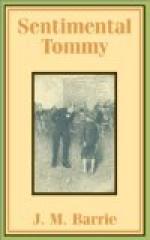She did not hear her boy as he dragged a chair to the press and standing on it got something down from the top shelf. She had forgotten him, and she started when presently the pen was slipped into her hand and Tommy said, “You can do it, mother, I wants yer to do it, mother, I won’t not greet, mother!”
When she saw what he wanted her to do she patted his face approvingly, but without realizing the extent of his sacrifice. She knew that he had some maggot in his head that made him regard Elspeth as a sore on the family honor, but ascribing his views to jealousy she had never tried seriously to change them. Her main reason for sending no news to Thrums of late had been but the cost of the stamp, though she was also a little conscience-stricken at the kind of letters she wrote, and the sight of the materials lying ready for her proved sufficient to draw her to the table.
“Is it to your grandmother you is writing the letter?” Tommy asked, for her grandmother had brought Mrs. Sandys up and was her only surviving relative. This was all Tommy knew of his mother’s life in Thrums, though she had told him much about other Thrums folk, and not till long afterwards did he see that there must be something queer about herself, which she was hiding from him.
This letter was not for her granny, however, and Tommy asked next, “Is it to Aaron Latta?” which so startled her that she dropped the pen.
“Whaur heard you that name?” she said sharply. “I never spoke it to you.”
“I’ve heard you saying it when you was sleeping, mother.”
“Did I say onything but the name? Quick, tell me.”
“You said, ‘Oh, Aaron Latta, oh, Aaron, little did we think, Aaron,’ and things like that. Are you angry with me, mother?”
“No,” she said, relieved, but it was some time before the desire to write came back to her. Then she told him “The letter is to a woman that was gey cruel to me,” adding, with a complacent pursing of her lips, the curious remark, “That’s the kind I like to write to best.”
The pen went scrape, scrape, but Tommy did not weary, though he often sighed, because his mother would never read aloud to him what she wrote. The Thrums people never answered her letters, for the reason, she said, that those she wrote to could not write, which seemed to simple Tommy to be a sufficient explanation. So he had never heard the inside of a letter talking, though a postman lived in the house, and even Shovel’s old girl got letters; once when her uncle died she got a telegram, which Shovel proudly wheeled up and down the street in a barrow, other blokes keeping guard at the side. To give a letter to a woman who had been cruel to you struck Tommy as the height of nobility.
“She’ll be uplifted when she gets it!” he cried.
“She’ll be mad when she gets it,” answered his mother, without looking up.
This was the letter:—




